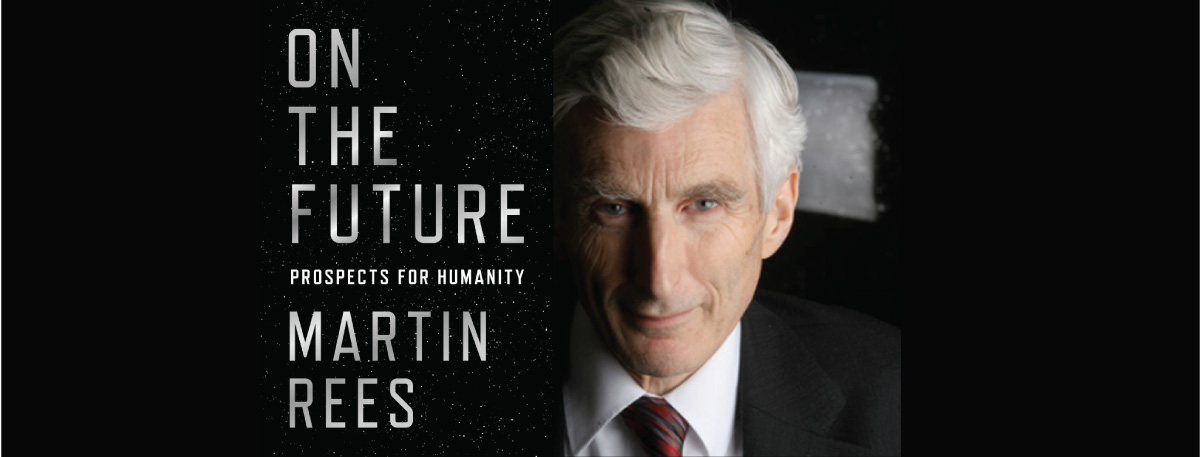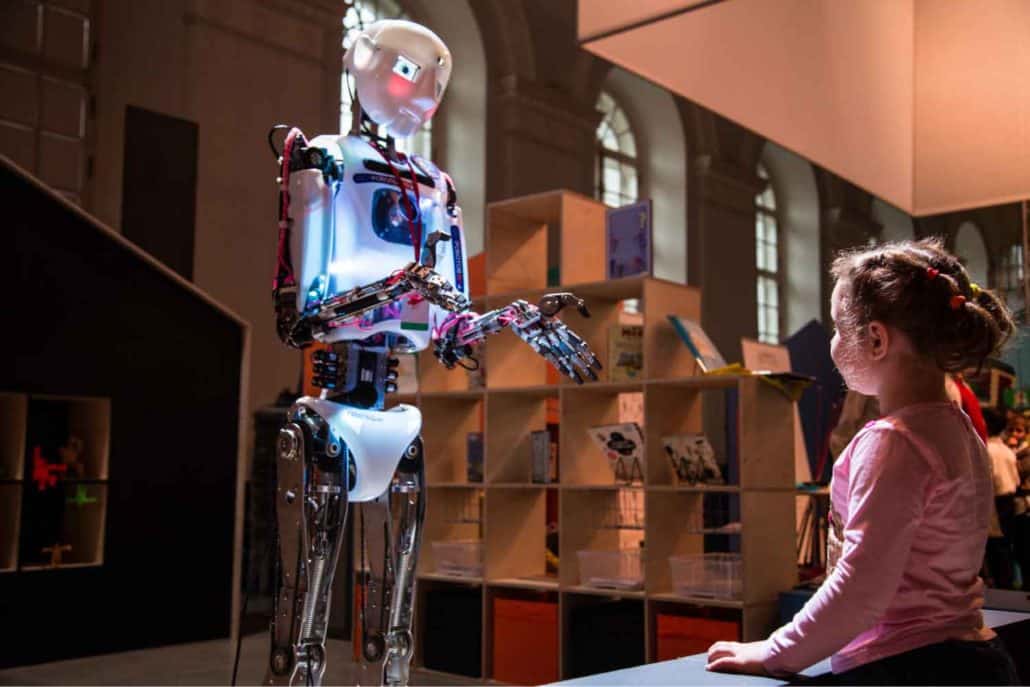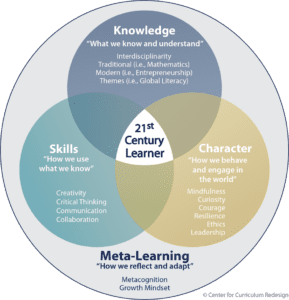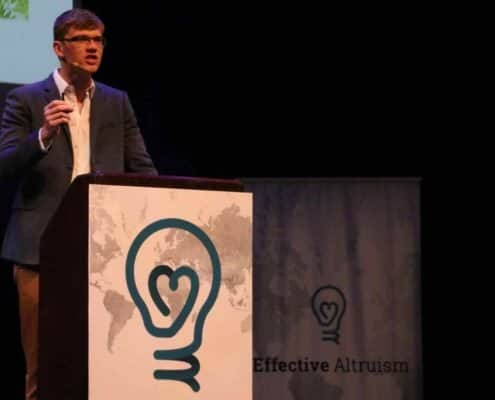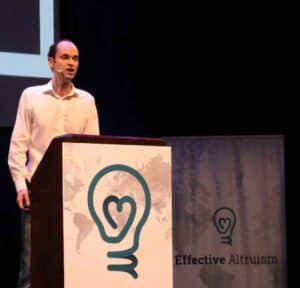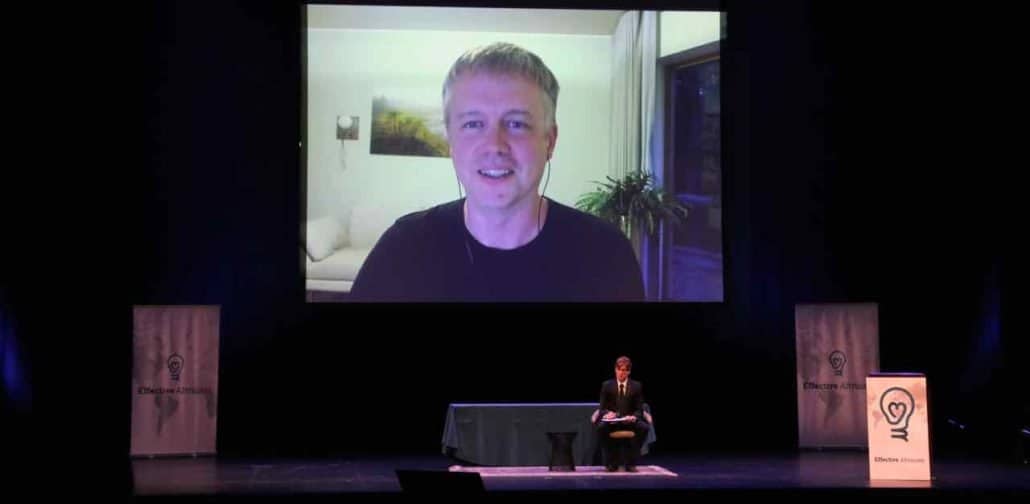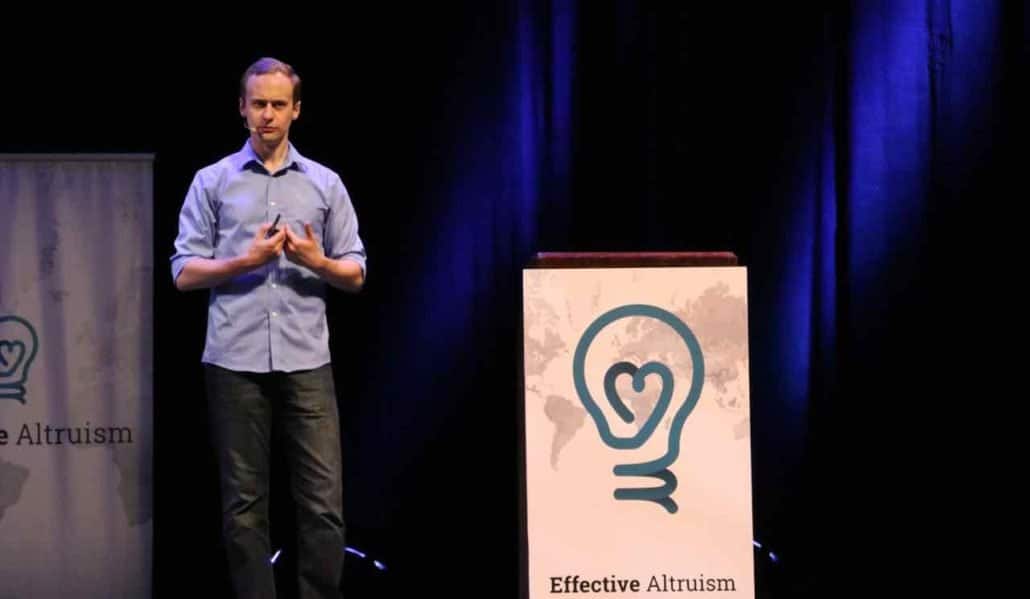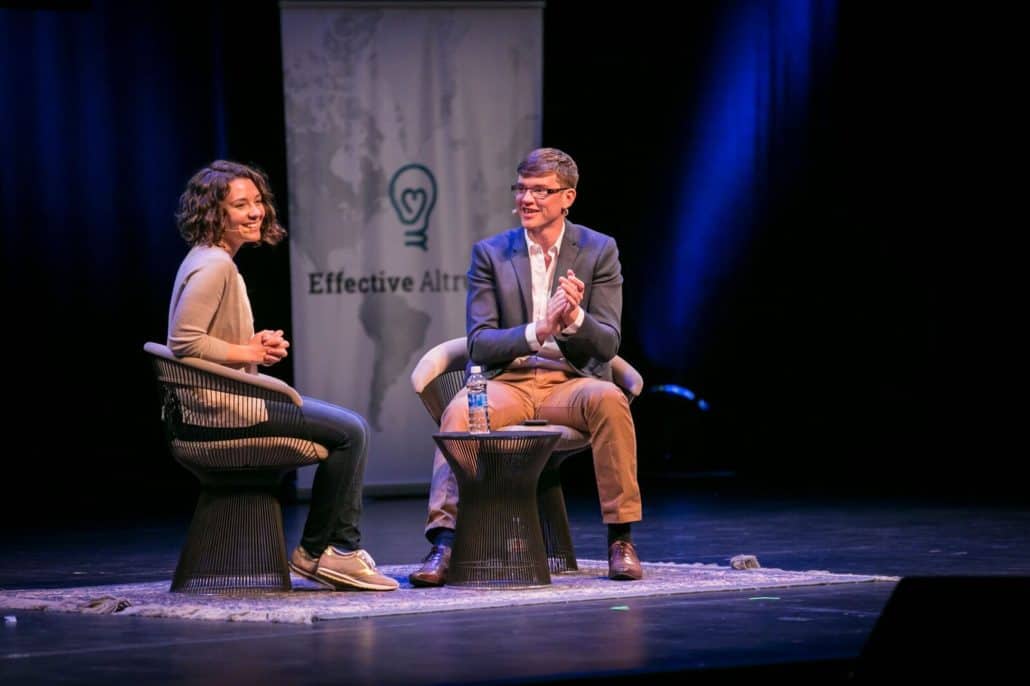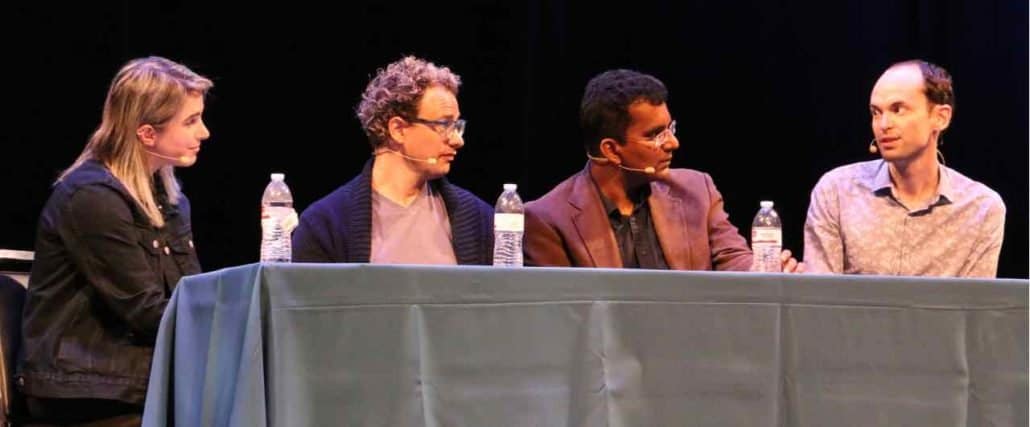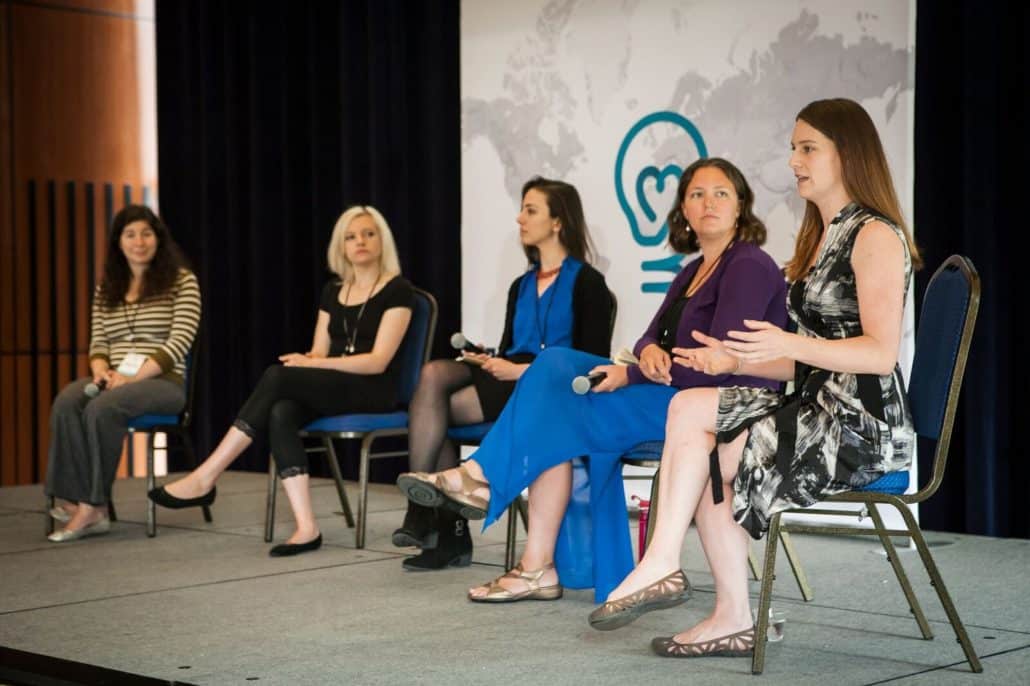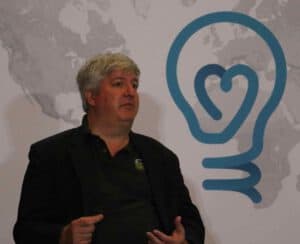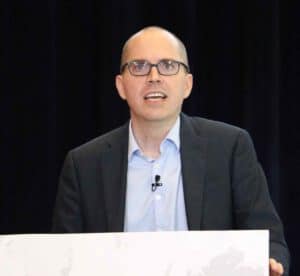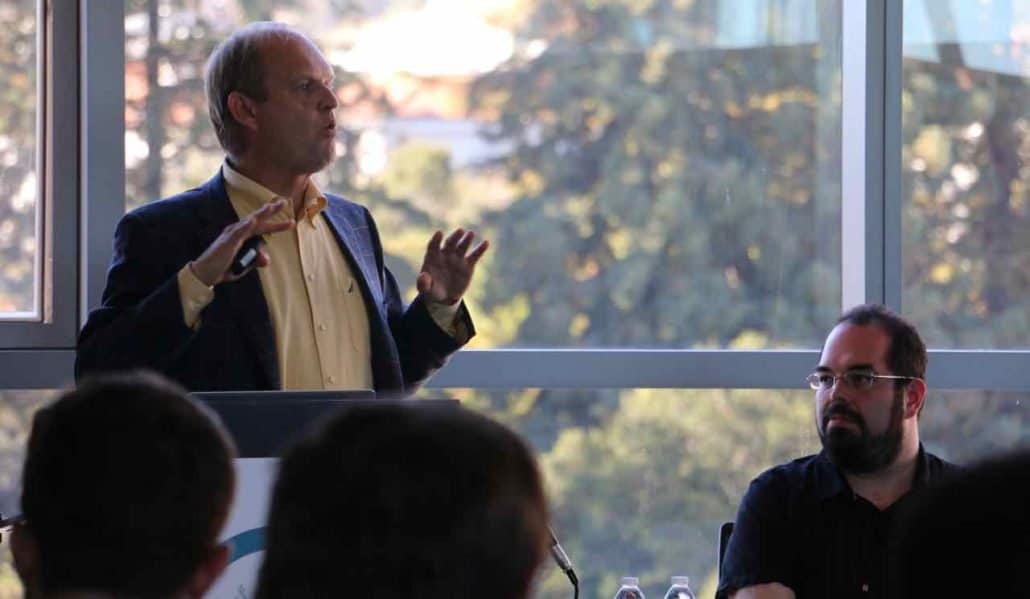FLI Podcast: On Consciousness, Morality, Effective Altruism & Myth with Yuval Noah Harari & Max Tegmark
Neither Yuval Noah Harari nor Max Tegmark need much in the way of introduction. Both are avant-garde thinkers at the forefront of 21st century discourse around science, technology, society and humanity’s future. This conversation represents a rare opportunity for two intellectual leaders to apply their combined expertise — in physics, artificial intelligence, history, philosophy and anthropology — to some of the most profound issues of our time. Max and Yuval bring their own macroscopic perspectives to this discussion of both cosmological and human history, exploring questions of consciousness, ethics, effective altruism, artificial intelligence, human extinction, emerging technologies and the role of myths and stories in fostering societal collaboration and meaning. We hope that you’ll join the Future of Life Institute Podcast for our final conversation of 2019, as we look toward the future and the possibilities it holds for all of us.
Topics discussed include:
- Max and Yuval’s views and intuitions about consciousness
- How they ground and think about morality
- Effective altruism and its cause areas of global health/poverty, animal suffering, and existential risk
- The function of myths and stories in human society
- How emerging science, technology, and global paradigms challenge the foundations of many of our stories
- Technological risks of the 21st century
Timestamps:
0:00 Intro
3:14 Grounding morality and the need for a science of consciousness
11:45 The effective altruism community and it’s main cause areas
13:05 Global health
14:44 Animal suffering and factory farming
17:38 Existential risk and the ethics of the long-term future
23:07 Nuclear war as a neglected global risk
24:45 On the risks of near-term AI and of artificial general intelligence and superintelligence
28:37 On creating new stories for the challenges of the 21st century
32:33 The risks of big data and AI enabled human hacking and monitoring
47:40 What does it mean to be human and what should we want to want?
52:29 On positive global visions for the future
59:29 Goodbyes and appreciations
01:00:20 Outro and supporting the Future of Life Institute Podcast
This podcast is possible because of the support of listeners like you. If you found this conversation to be meaningful or valuable consider supporting it directly by donating at futureoflife.org/donate. Contributions like yours make these conversations possible.
All of our podcasts are also now on Spotify and iHeartRadio! Or find us on SoundCloud, iTunes, Google Play and Stitcher.
Lucas Perry: Welcome to the Future of Life Institute Podcast. I’m Lucas Perry. Today, I’m excited to be bringing you a conversation between professor, philosopher, and historian Yuval Noah Harari and MIT physicist and AI researcher, as well as Future of Life Institute president, Max Tegmark. Yuval is the author of popular science best sellers, Sapiens: A Brief History of Humankind, Homo Deus: A Brief History of Tomorrow, and of 21 Lessons for the 21st Century. Max is the author of Our Mathematical Universe and Life 3.0: Being human in the Age of Artificial Intelligence.
This episode covers a variety of topics related to the interests and work of both Max and Yuval. It requires some background knowledge for everything to make sense and so i’ll try to provide some necessary information for listeners unfamiliar with the area of Max’s work in particular here in the intro. If you already feel well acquainted with Max’s work, feel free to skip ahead a minute or use the timestamps in the description for the podcast.
Topics discussed in this episode include: morality, consciousness, the effective altruism community, animal suffering, existential risk, the function of myths and stories in our world, and the benefits and risks of emerging technology. For those new to the podcast or effective altruism, effective altruism or EA for short is a philosophical and social movement that uses evidence and reasoning to determine the most effective ways of benefiting and improving the lives of others. And existential risk is any risk that has the potential to eliminate all of humanity or, at the very least, to kill large swaths of the global population and leave the survivors unable to rebuild society to current living standards. Advanced emerging technologies are the most likely source of existential risk in the 21st century, for example through unfortunate uses of synthetic biology, nuclear weapons, and powerful future artificial intelligence misaligned with human values and objectives.
The Future of Life Institute is a non-profit and this podcast is funded and supported by listeners like you. So if you find what we do on this podcast to be important and beneficial, please consider supporting the podcast by donating at futureoflife.org/donate
These contributions make it possible for us to bring you conversations like these and to develop the podcast further. You can also follow us on your preferred listening platform by searching for us directly or following the links on the page for this podcast found in the description.
And with that, here is our conversation between Max Tegmark and Yuval Noah Harari.
Max Tegmark: Maybe to start at a place where I think you and I both agree, even though it’s controversial, I get the sense from reading your books that you feel that morality has to be grounded on experience, subjective experience. It’s just what I like to call consciousness. I love this argument you’ve given, for example, that people who think consciousness is just bullshit and irrelevant. You challenge them to tell you what’s wrong with torture if it’s just a bunch of electrons and quarks moving around this way rather than that way.
Yuval Noah Harari: Yeah. I think that there is no morality without consciousness and without subjective experiences. At least for me, this is very, very obvious. One of my concerns, again, if I think about the potential rise of AI, is that AI will be super superintelligence but completely non-conscious, which is something that we never had to deal with before. There’s so much of the philosophical and theological discussions of what happens when there is a greater intelligence in the world. We’ve been discussing this for thousands of years with God of course as the object of discussion, but the assumption always was that this greater intelligence would be A) conscious in some sense, and B) good, infinitely good.
And therefore I think that the question we are facing today is completely different and to a large extent is I suspect that we are really facing philosophical bankruptcy that what we’ve done for thousands of years didn’t really prepare us for the kind of challenge that we have now.
Max Tegmark: I certainly agree that we have a very urgent challenge there. I think there is an additional risk which comes from the fact that, I’m embarrassed as a scientist that we actually don’t know for sure which kinds of information processing are conscious and which are not. For many, many years, I’ve been told for example that it’s okay to put lobsters in hot water to boil them but alive before we eat them because they don’t feel any suffering. And then I guess some guy asked the lobster does this hurt? And it didn’t say anything and it was a self serving argument. But then there was a recent study out that showed that actually lobsters do feel pain and they banned lobster boiling in Switzerland now.
I’m very nervous whenever we humans make these very self serving arguments saying, don’t worry about the slaves. It’s okay. They don’t feel, they don’t have a soul, they won’t suffer or women don’t have a soul or animals can’t suffer. I’m very nervous that we’re going to make the same mistake with machines just because it’s so convenient. When I feel the honest truth is, yeah, maybe future superintelligent machines won’t have any experience, but maybe they will. And I think we really have a moral imperative there to do the science to answer that question because otherwise we might be creating enormous amounts of suffering that we don’t even know exists.
Yuval Noah Harari: For this reason and for several other reasons, I think we need to invest as much time and energy in researching consciousness as we do in researching and developing intelligence. If we develop sophisticated artificial intelligence before we really understand consciousness, there is a lot of really big ethical problems that we just don’t know how to solve. One of them is the potential existence of some kind of consciousness in these AI systems, but there are many, many others.
Max Tegmark: I’m so glad to hear you say this actually because I think we really need to distinguish between artificial intelligence and artificial consciousness. Some people just take for granted that they’re the same thing.
Yuval Noah Harari: Yeah, I’m really amazed by it. I’m having quite a lot of discussions about these issues in the last two or three years and I’m repeatedly amazed that a lot of brilliant people just don’t understand the difference between intelligence and consciousness, and when it comes up in discussions about animals, but it also comes up in discussions about computers and about AI. To some extent the confusion is understandable because in humans and other mammals and other animals, consciousness and intelligence, they really go together, but we can’t assume that this is the law of nature and that it’s always like that. In a very, very simple way, I would say that intelligence is the ability to solve problems. Consciousness is the ability to feel things like pain and pleasure and love and hate.
Now in humans and chimpanzees and dogs and maybe even lobsters, we solve problems by having feelings. A lot of the problems we solve, who to mate with and where to invest our money and who to vote for in the elections, we rely on our feelings to make these decisions, but computers make decisions a completely different way. At least today, very few people would argue that computers are conscious and still they can solve certain types of problems much, much better than we.
They have high intelligence in a particular field without having any consciousness and maybe they will eventually reach superintelligence without ever developing consciousness. And we don’t know enough about these ideas of consciousness and superintelligence, but it’s at least feasible that you can solve all problems better than human beings and still have zero consciousness. You just do it in a different way. Just like airplanes fly much faster than birds without ever developing feathers.
Max Tegmark: Right. That’s definitely one of the reasons why people are so confused. There are two other reasons I noticed also among even very smart people why they are utterly confused on this. One is there’s so many different definitions of consciousness. Some people define consciousness in a way that’s almost equivalent intelligence, but if you define it the way you did, the ability to feel things simply having subjective experience. I think a lot of people get confused because they have always thought of subjective experience and intelligence for that matter as something mysterious. That can only exist in biological organisms like us. Whereas what I think we’re really learning from the whole last of century of progress in science is that no, intelligence and consciousness are all about information processing.
People fall prey to this carbon chauvinism idea that it’s only carbon or meat that can have these traits. Whereas in fact it really doesn’t matter whether the information is processed by a carbon atom and a neuron in the brain or by the silicon atom in a computer.
Yuval Noah Harari: I’m not sure I completely agree. I mean, we still don’t have enough data on that. There doesn’t seem to be any reason that we know of that consciousness would be limited to carbon based life forms, but so far this is the case. So maybe we don’t know something. My hunch is that it could be possible to have non-organic consciousness, but until we have better evidence, there is an open possibility that maybe there is something about organic biochemistry, which is essential and we just don’t understand.
And also with the other open case, we are not really sure that’s consciousness is just about information processing. I mean, at present, this is the dominant view in the life sciences, but we don’t really know because we don’t understand consciousness. My personal hunch is that nonorganic consciousness is possible, but I wouldn’t say that we know that for certain. And the other point is that really if you think about it in the broadest sense possible, I think that there is an entire potential universe of different conscious states and we know just a tiny, tiny bit of it.
Max Tegmark: Yeah.
Yuval Noah Harari: Again, thinking a little about different life forms, so human beings are just one type of life form and there are millions of other life forms that existed and billions of potential life forms that never existed but might exist in the future. And it’s a bit like that with consciousness that we really know just human consciousness, we don’t understand even the consciousness of other animals and beyond that potentially there is an infinite number of conscious states or traits that never existed and might exist in the future.
Max Tegmark: I agree with all of that. And I think if you can have nonorganic consciousness, artificial consciousness, which would be my guess, although we don’t know it, I think it’s quite clear then that the mind space of possible artificial consciousness is vastly larger than anything that evolution has given us, so we have to have a very open mind.
If we simply take away from this that we should understand which entities biological and otherwise are conscious and can experience suffering, pleasure and so on, and we try to base our morality on this idea that we want to create more positive experiences and eliminate suffering, then this leads straight into what I find very much at the core of the so called effective altruism community, which we with the Future of Life Institute view ourselves as part of where the idea is we want to help do what we can to make a future that’s good in that sense. Lots of positive experiences, not negative ones and we want to do it effectively.
We want to put our limited time and money and so on into those efforts which will make the biggest difference. And the EA community has for a number of years been highlighting a top three list of issues that they feel are the ones that are most worth putting effort into in this sense. One of them is global health, which is very, very non-controversial. Another one is animal suffering and reducing it. And the third one is preventing life from going extinct by doing something stupid with technology.
I’m very curious whether you feel that the EA movement has basically picked out the correct three things to focus on or whether you have things you would subtract from that list or add to it. Global health, animal suffering, X-risk.
Yuval Noah Harari: Well, I think that nobody can do everything, so whether you’re an individual or an organization, it’s a good idea to pick a good cause and then focus on it and not spend too much time wondering about all the other things that you might do. I mean, these three causes are certainly some of the most important in the world. I would just say that about the first one. It’s not easy at all to determine what are the goals. I mean, as long as health means simply fighting illnesses and sicknesses and bringing people up to what is considered as a normal level of health, then that’s not very problematic.
But in the coming decades, I think that the healthcare industry would focus and more, not on fixing problems but rather on enhancing abilities, enhancing experiences, enhancing bodies and brains and minds and so forth. And that’s much, much more complicated both because of the potential issues of inequality and simply that we don’t know where to aim for. One of the reasons that when you ask me at first about morality, I focused on suffering and not on happiness is that suffering is a much clearer concept than happiness and that’s why when you talk about health care, if you think about this image of the line of normal health, like the baseline of what’s a healthy human being, it’s much easier to deal with things falling under this line than things that potentially are above this line. So I think even this first issue, it will become extremely complicated in the coming decades.
Max Tegmark: And then for the second issue on animal suffering, you’ve used some pretty strong words before. You’ve said that industrial farming is one of the worst crimes in history and you’ve called the fate of industrially farmed animals one of the most pressing ethical questions of our time. A lot of people would be quite shocked when they hear you using strong words about this since they routinely eat factory farmed meat. How do you explain to them?
Yuval Noah Harari: This is quite straightforward. I mean, we are talking about billions upon billions of animals. The majority of large animals today in the world are either humans or are domesticated animals, cows and pigs and chickens and so forth. And so we’re talking about a lot of animals and we are talking about a lot of pain and misery. The industrially farmed cow and chicken are probably competing for the title of the most miserable creature that ever existed. They are capable of experiencing a wide range of sensations and emotions and in most of these industrial facilities they are experiencing the worst possible sensations and emotions.
Max Tegmark: In my case, you’re preaching to the choir here. I find this so disgusting that my wife and I just decided to mostly be vegan. I don’t go preach to other people about what they should do, but I just don’t want to be a part of this. It reminds me so much also things you’ve written about yourself, about how people used to justify having slaves before by saying, “It’s the white man’s burden. We’re helping the slaves. It’s good for them”. And much of the same way now, we make these very self serving arguments for why we should be doing this. What do you personally take away from this? Do you eat meat now, for example?
Yuval Noah Harari: Personally I define myself as vegan-ish. I mean I’m not strictly vegan. I don’t want to make kind of religion out of it and start thinking in terms of purity and whatever. I try to limit as far as possible mindful movement with industries that harm animals for no good reason and it’s not just meat and dairy and eggs, it can be other things as well. The chains of causality in the world today are so complicated that you cannot really extricate yourself completely. It’s just impossible. So for me, and also what I tell other people is just do your best. Again, don’t make it into a kind of religious issue. If somebody comes and tells you that you, I’m now thinking about this animal suffering and I decided to have one day a week without meat then don’t start blaming this person for eating meat the other six days. Just congratulate them on making one step in the right direction.
Max Tegmark: Yeah, that sounds not just like good morality but also good psychology if you actually want to nudge things in the right direction. And then coming to the third one, existential risk. There, I love how Nick Bostrom asks us to compare these two scenarios one in which some calamity kills 99% of all people and another where it kills 100% of all people and then he asks how much worse is the second one. The point being obviously is you know that if we kill everybody we might actually forfeit having billions or quadrillions or more of future minds in the future experiencing these amazing things for billions of years. This is not something I’ve seen you talk as much about in you’re writing it. So I’m very curious how you think about this morally? How you weigh future experiences that could exist versus the ones that we know exist now?
Yuval Noah Harari: I don’t really know. I don’t think that we understand consciousness and experience well enough to even start making such calculations. In general, my suspicion, at least based on our current knowledge, is that it’s simply not a mathematical entity that can be calculated. So we know all these philosophical riddles that people sometimes enjoy so much debating about whether you have five people have this kind and a hundred people of that kind and who should you save and so forth and so on. It’s all based on the assumption that experience is a mathematical entity that can be added and subtracted. And my suspicion is that it’s just not like that.
To some extent, yes, we make these kinds of comparison and calculations all the time, but on a deeper level, I think it’s taking us in the wrong direction. At least at our present level of knowledge, it’s not like eating ice cream is one point of happiness. Killing somebody is a million points of misery. So if by killing somebody we can allow 1,000,001 persons to enjoy ice cream, it’s worth it.
I think the problem here is not that we given the wrong points to the different experiences, it’s just it’s not a mathematical entity in the first place. And again, I know that in some cases we have to do these kinds of calculations, but I will be extremely careful about it and I would definitely not use it as the basis for building entire moral and philosophical projects.
Max Tegmark: I certainly agree with you that it’s an extremely difficult set of questions you get into if you try to trade off positives against negatives, like you mentioned in the ice cream versus murder case there. But I still feel that all in all, as a species, we tend to be a little bit too sloppy and flippant about the future and maybe partly because we haven’t evolved to think so much about what happens in billions of years anyway, and if we look at how reckless we’ve been with nuclear weapons, for example, I recently was involved with our organization giving this award to honor Vasily Arkhipov who quite likely prevented nuclear war between the US and the Soviet Union, and most people hadn’t even heard about that for 40 years. More people have heard of Justin Bieber, than Vasily Arkhipov even though I would argue that that would really unambiguously had been a really, really bad thing and that we should celebrate people who do courageous acts that prevent nuclear war, for instance.
In the same spirit, I often feel concerned that there’s so little attention, even paid to risks that we drive ourselves extinct or cause giants catastrophes compared to how much attention we pay to the Kardashians or whether we can get 1% less unemployment next year. So I’m curious if you have some sympathy for my angst here or whether you think I’m overreacting.
Yuval Noah Harari: I completely agree. I often define it that we are now kind of irresponsible gods. Certainly with regard to the other animals and the ecological system and with regard to ourselves, we have really divine powers of creation and destruction, but we don’t take our job seriously enough. We tend to be very irresponsible in our thinking, and in our behavior. On the other hand, part of the problem is that the number of potential apocalypses is growing exponentially over the last 50 years. And as a scholar and as a communicator, I think it’s part of our job to be extremely careful in the way that we discuss these issues with the general public. And it’s very important to focus the discussion on the more likely scenarios because if we just go on bombarding people with all kinds of potential scenarios of complete destruction, very soon we just lose people’s attention.
They become extremely pessimistic that everything is hopeless. So why worry about all that? So I think part of the job of the scientific community and people who deal with these kinds of issues is to really identify the most likely scenarios and focus the discussion on that. Even if there are some other scenarios which have a small chance of occurring and completely destroying all of humanity and maybe all of life, but we just can’t deal with everything at the same time.
Max Tegmark: I completely agree with that. With one caveat, I think it’s very much in the spirit of effective altruism, what you said. We want to focus on the things that really matter the most and not turn everybody into hypochondriac, paranoid, getting worried about everything. The one caveat I would give is, we shouldn’t just look at the probability of each bad thing happening but we should look at the expected damage it will do so the probability of times how bad it is.
Yuval Noah Harari: I agree.
Max Tegmark: Because nuclear war for example, maybe the chance of having an accidental nuclear war between the US and Russia is only 1% per year or 10% per year or one in a thousand per year. But if you have the nuclear winter caused by that by soot and smoke in the atmosphere, you know, blocking out the sun for years, that could easily kill 7 billion people. So most people on Earth and mass starvation because it would be about 20 Celsius colder. That means that on average if it’s 1% chance per year, which seems small, you’re still killing on average 70 million people. That’s the number that sort of matters I think. That means we should make it a higher priority to reduce that more.
Yuval Noah Harari: With nuclear war, I would say that we are not concerned enough. I mean, too many people, including politicians have this weird impression that well, “Nuclear war, that’s history. No, that was in the 60s and 70s people worried about it.”
Max Tegmark: Exactly.
Yuval Noah Harari: “It’s not a 21st century issue.” This is ridiculous. I mean we are now in even greater danger, at least in terms of the technology than we were in the Cuban missile crisis. But you must remember this in Stanley Kubrick, Dr Strange Love-
Max Tegmark: One of my favorite films of all time.
Yuval Noah Harari: Yeah. And so the subtitle of the film is “How I Stopped Fearing and Learned to Love the Bomb.”
Max Tegmark: Exactly.
Yuval Noah Harari: And the funny thing is it actually happened. People stopped fearing them. Maybe they don’t love it very much, but compared to the 50s and 60s people just don’t talk about it. Like you look at the Brexit debate in Britain and Britain is one of the leading nuclear powers in the world and it’s not even mentioned. It’s not part of the discussion anymore. And that’s very problematic because I think that this is a very serious existential threat. But I’ll take a counter example, which is in the field of AI, even though I understand the philosophical importance of discussing the possibility of general AI emerging in the future and then rapidly taking over the world and you know all the paperclips scenarios and so forth.
I think that at the present moment it really distracts attention of people from the immediate dangers of the AI arms race, which has a far, far higher chance of materializing in the next, say, 10, 20, 30 years. And we need to focus people’s minds on these short term dangers. And I know that there is a small chance that general AI would be upon us say in the next 30 years. But I think it’s a very, very small chance, whereas the chance that kind of primitive AI will completely disrupt the economy, the political system and human life in the next 30 years is about a 100%. It’s bound to happen.
Max Tegmark: Yeah.
Yuval Noah Harari: And I worry far more about what primitive AI will do to the job market, to the military, to people’s daily lives than about a general AI appearing in the more distant future.
Max Tegmark: Yeah, there are a few reactions to this. We can talk more about artificial general intelligence and superintelligence later if we get time. But there was a recent survey of AI researchers around the world asking what they thought and I was interested to note that actually most of them guessed that we will get artificial general intelligence within decades. So I wouldn’t say that the chance is small, but I would agree with you, that is certainly not going to happen tomorrow.
But if we eat our vitamins, you and I and meditate, go to the gym, it’s quite likely we will actually get to experience it. But more importantly, coming back to what you said earlier, I see all of these risks as really being one in the same risk in the sense that what’s happened is of course that science has kept getting ever more powerful. And science definitely gives us ever more powerful technology. And I love technology. I’m a nerd. I work at a university that has technology in its name and I’m optimistic we can create an inspiring high tech future for life if we win what I like to call the wisdom race.
The race between the growing power of the technology and the growing wisdom with which we manage it or putting it in your words, that you just used there, if we can basically learn to take more seriously our job as stewards of this planet, you can look at every science and see exactly the same thing happening. So we physicists are kind of proud that we gave the world cell phones and computers and lasers, but our problem child has been nuclear energy obviously, nuclear weapons in particular. Chemists are proud that they gave the world all these great new materials and their problem child is climate change. Biologists in my book actually have done the best so far, they actually got together in the 70s and persuaded leaders to ban biological weapons and draw a clear red line more broadly between what was acceptable and unacceptable uses of biology.
And that’s why today most people think of biology as really a force for good, something that cures people or helps them live healthier lives. And I think AI is right now lagging a little bit in time. It’s finally getting to the point where they’re starting to have an impact and they’re grappling with the same kind of question. They haven’t had big disasters yet, so they’re in the biology camp there, but they’re trying to figure out where do they draw the line between acceptable and unacceptable uses so you don’t get a crazy military AI arms race in lethal autonomous weapons, so you don’t create very destabilizing income inequality so that AI doesn’t create 1984 on steroids, et cetera.
And I wanted to ask you about what sort of new story as a society you feel we need in order to tackle these challenges. And I’ve been very, very persuaded by your arguments that stories are so central to society for us to collaborate and accomplish stuff, but you’ve also made a really compelling case. I think that’s the most popular recent stories are all getting less powerful or popular. Communism, now there’s a lot of disappointment, and this liberalism and it feels like a lot of people are kind of craving for a new story that involves technology somehow and that can help us get our act together and also help us feel meaning and purpose in this world. But I’ve never in your books seen a clear answer to what you feel that this new story should be.
Yuval Noah Harari: Because I don’t know. If I knew the new story, I will tell it. I think we are now in a kind of double bind, we have to fight on two different fronts. On the one hand we are witnessing in the last few years the collapse of the last big modern story of liberal democracy and liberalism more generally, which has been, I would say as a story, the best story humans ever came up with and it did create the best world that humans ever enjoyed. I mean the world of the late 20th century and early 21st century with all its problems, it’s still better for humans, not for cows or chickens for humans, it’s still better than it’s any previous moment in history.
There are many problems, but anybody who says that this was a bad idea, I would like to hear which year are you thinking about as a better year? Now in 2019, when was it better? In 1919, in 1719, in 1219? I mean, for me, it’s obvious this has been the best story we have come up with.
Max Tegmark: That’s so true. I have to just admit that whenever I read the news for too long, I start getting depressed. But then I always cheer myself up by reading history and reminding myself it was always worse in the past.
Yuval Noah Harari: That never fails. I mean, the last four years have been quite bad, things are deteriorating, but we are still better off than in any previous era, but people are losing faith. In this story, we are reaching really a situation of zero story. All the big stories of the 20th century have collapsed or are collapsing and the vacuum is currently filled by nostalgic fantasies, nationalistic and religious fantasies, which simply don’t offer any real solutions to the problems of the 21st century. So on the one hand we have the task of supporting or reviving the liberal democratic system, which is so far the only game in town. I keep listening to the critics and they have a lot of valid criticism, but I’m waiting for the alternative and the only thing I hear is completely unrealistic nostalgic fantasies about going back to some past golden era that as a historian I know was far, far worse, and even if it was not so far worse, you just can’t go back there. You can’t recreate the 19th century or the middle ages under the conditions of the 21st century. It’s impossible.
So we have this one struggle to maintain what we have already achieved, but then at the same time, on a much deeper level, my suspicion is that the liberal stories we know it at least is really not up to the challenges of the 21st century because it’s built on foundations that the new science and especially the new technologies of artificial intelligence and bioengineering are just destroying the belief we are inherited in the autonomous individual, in free will, in all these basically liberal mythologies. They will become increasingly untenable in contact with new powerful bioengineering and artificial intelligence.
To put it in a very, very concise way, I think we are entering the era of hacking human beings, not just hacking smartphones and bank accounts, but really hacking homo sapiens which was impossible before. I mean, AI gives us the computing power necessary and biology gives us the necessary biological knowledge and when you combine the two you get the ability to hack human beings and if you continue to try, and build society on the philosophical ideas of the 18th century about the individual and freewill and then all that in a world where it’s feasible technically to hack millions of people systematically, it’s just not going to work. And we need an updated story, I’ll just finish this thought. And our problem is that we need to defend the story from the nostalgic fantasies at the same time that we are replacing it by something else. And it’s just very, very difficult.
When I began writing my books like five years ago, I thought the real project was to really go down to the foundations of the liberal story, expose the difficulties and build something new. And then you had all these nostalgic populous eruption of the last four or five years, and I personally find myself more and more engaged in defending the old fashioned liberal story instead of replacing it. Intellectually, it’s very frustrating because I think the really important intellectual work is finding out the new story, but politically it’s far more urgent. If we allow the emergence of some kind of populist authoritarian regimes, then whatever comes out of it will not be a better story.
Max Tegmark: Yeah, unfortunately I agree with your assessment here. I love to travel. I work in basically the United Nations like environment at my university with students from all around the world, and I have this very strong sense that people are feeling increasingly lost around the world today because the stories that used to give them a sense of purpose and meaning and so on are sort of dissolving in front of their eyes. And of course, we don’t like to feel lost then likely to jump on whatever branches are held out for us. And they are often just retrograde things. Let’s go back to the good old days and all sorts of other unrealistic things. But I agree with you that the rise in population we’re seeing now is not the cause. It’s a symptom of people feeling lost.
So I think I was a little bit unfair to ask you in a few minutes to answer the toughest question of our time, what should our new story be? But maybe we could break it into pieces a little bit and say what are at least some elements that we would like the new story to have? For example, it should accomplish, of course, multiple things. It has to incorporate technology in a meaningful way, which our past stories did not and has to incorporate AI progress in biotech, for example. And it also has to be a truly global story, I think this time, which isn’t just a story about how America is going to get better off or China is going to get better off, but one about how we’re all going to get better off together.
And we can put up a whole bunch of other requirements. If we start maybe with this part about the global nature of the story, people disagree violently about so many things around world, but are there any ingredients at all of the story that you think people around the world, would already agreed to some principles or ideas?
Yuval Noah Harari: Again to, I don’t really know. I mean, I don’t know what the new story would look like. Historically, these kinds of really grand narratives, they aren’t created by two, three people having a discussion and thinking, okay, what new stories should we tell? It’s far deeper and more powerful forces that come together to create these new stories. I mean, even trying to say, okay, we don’t have the full view, but let’s try to put a few ingredients in place. The whole thing about the story is that the whole comes before the parts. The narrative is far more important than the individual facts that build it up.
So I’m not sure that we can start creating the story by just, okay, let’s put the first few sentences and who knows how it will continue. You wrote books. I write books, we know that the first few sentences are the last sentences that you usually write.
Max Tegmark: That’s right.
Yuval Noah Harari: Only when you know how the whole book is going to look like, but then you go back to the beginning and you write the first few sentences.
Max Tegmark: Yeah. And sometimes the very last thing you write is the new title.
Yuval Noah Harari: So I agree that whatever the new story is going to be, it’s going to be global. The world is now too small and too interconnected to have just a story for one part of the world. It won’t work. And also it will have to take very seriously both the most updated science and the most updated technology. Something that liberal democracy as we know it, it’s basically still in the 18th century. It’s taking an 18th century story and simply following it to its logical conclusions. For me, maybe the most amazing thing about liberal democracy is it really completely disregarded all the discoveries of the life sciences over the last two centuries.
Max Tegmark: And of the technical sciences!
Yuval Noah Harari: I mean, as if Darwin never existed and we know nothing about evolution. I mean, you can basically meet these folks from the middle of the 18th century, whether it’s Rousseau, Jefferson, and all these guys, and they will be surprised by some of the conclusions we have drawn for the basis they provided us. But fundamentally it’s nothing has changed. Darwin didn’t really change anything. Computers didn’t really change anything. And I think the next story won’t have that luxury of being able to ignore the discoveries of science and technology.
The number one thing it we’ll have to take into account is how do humans live in a world when there is somebody out there that knows you better than you know yourself, but that somebody isn’t God, that somebody is a technological system, which might not be a good system at all. That’s a question we never had to face before. We could always comfort yourself with the idea that we are kind of a black box with the rest of humanity. Nobody can really understand me better than I understand myself. The king, the emperor, the church, they don’t really know what’s happening within me. Maybe God knows. So we had a lot of discussions about what to do with that, the existence of a God who knows us better than we know ourselves, but we didn’t really have to deal with a non-divine system that can hack us.
And this system is emerging. I think it will be in place within our lifetime in contrast to generally artificial intelligence that I’m skeptical whether I’ll see it in my lifetime. I’m convinced we will see, if we live long enough, a system that knows us better than we know ourselves and the basic premises of democracy, of free market capitalism, even of religion just don’t work in such a world. How does democracy function in a world when somebody understands the voter better than the voter understands herself or himself? And the same with the free market. I mean, if the customer is not right, if the algorithm is right, then we need a completely different economic system. That’s the big question that I think we should be focusing on. I don’t have the answer, but whatever story will be relevant to the 21st century, will have to answer this question.
Max Tegmark: I certainly agree with you that democracy has totally failed to adapt to the developments in the life sciences and I would add to that to the developments in the natural sciences too. I watched all of the debates between Trump and Clinton in the last election here in the US and I didn’t know what is artificial intelligence getting mentioned even a single time, not even when they talked about jobs. And the voting system we have, with an electoral college system here where it doesn’t even matter how people vote except in a few swing states where there’s so little influence from the voter to what actually happens. Even though we now have blockchain and could easily implement technical solutions where people will be able to have much more influence. Just reflects that we basically declared victory on our democratic system hundreds of years ago and haven’t updated it.
And I’m very interested in how we can dramatically revamp it if we believe in some form of democracy so that we actually can have more influence on how our society is run as individuals and how we can have good reason to actually trust the system. If it is able to hack us. That is actually working in our best interest. There’s a key tenant in religions that you’re supposed to be able to trust the God as having your best interest in mind. And I think many people in the world today do not trust that their political leaders actually have their best interest in mind.
Yuval Noah Harari: Certainly, I mean that’s the issue. You give a really divine powers to far from divine systems. We shouldn’t be too pessimistic. I mean, the technology is not inherently evil either. And what history teaches us about technology is that technology is also never deterministic. You can use the same technologies to create very different kinds of societies. We saw that in the 20th century when the same technologies were used to build communist dictatorships and liberal democracies, there was no real technological difference between the USSR and the USA. It was just people making different decisions what to do with the same technology.
I don’t think that the new technology is inherently anti-democratic or inherently anti-liberal. It really is about choices that people make even in what kind of technological tools to develop. If I think about, again, AI and surveillance, at present we see all over the world that corporations and governments are developing AI tools to monitor individuals, but technically we can do exactly the opposite. We can create tools that monitor and survey government and corporations in the service of individuals. For instance, to fight corruption in the government as an individual. It’s very difficult for me to say monitor nepotism, politicians appointing all kinds of family members to lucrative positions in the government or in the civil service, but it should be very easy to build an AI tool that goes over the immense amount of information involved. And in the end you just get a simple application on your smartphone you enter the name of a politician and you immediately see within two seconds who he appointed or she appointed from their family and friends to what positions. It should be very easy to do it. I don’t see the Chinese government creating such an application anytime soon, but people can create it.
Or if you think about the fake news epidemic, basically what’s happening is that corporations and governments are hacking us in their service, but the technology can work the other way around. We can develop an antivirus for the mind, the same way we developed antivirus for the computer. We need to develop an antivirus for the mind, an AI system that serves me and not a corporation or a government, and it gets to know my weaknesses in order to protect me against manipulation.
At present, what’s happening is that the hackers are hacking me. they get to know my weaknesses and that’s how they are able to manipulate me. For instance, with fake news. If they discover that I already have a bias against immigrants, they show me one fake news story, maybe about a group of immigrants raping local women. And I easily believe that because I already have this bias. My neighbor may have an opposite bias. She may think that anybody who opposes immigration is a fascist and the same hackers will find that out and will show her a fake news story about, I don’t know, right wing extremists murdering immigrants and she will believe that.
And then if I meet my neighbor, there is no way we can have a conversation about immigration. Now we can and should, develop an AI system that serves me and my neighbor and alerts us. Look, somebody is trying to hack you, somebody trying to manipulate you. And if we learn to trust this system that it serves us, it doesn’t serve any corporation or government. It’s an important tool in protecting our minds from being manipulated. Another tool in the same field, we are now basically feeding enormous amounts of mental junk food to our minds.
We spend hours every day basically feeding our hatred, our fear, our anger, and that’s a terrible and stupid thing to do. The thing is that people discovered that the easiest way to grab our attention is by pressing the hate button in the mind or the fear button in the mind, and we are very vulnerable to that.
Now, just imagine that somebody develops a tool that shows you what’s happening to your brain or to your mind as you’re watching these YouTube clips. Maybe it doesn’t block you, it’s not Big Brother, that blocks, all these things. It’s just like when you buy a product and it shows you how many calories are in the product and how much saturated fat and how much sugar there is in the product. So at least in some cases you learn to make better decisions. Just imagine that you have this small window in your computer which tells you what’s happening to your brain as your watching this video and what’s happening to your levels of hatred or fear or anger and then make your own decision. But at least you are more aware of what kind of food you’re giving to your mind.
Max Tegmark: Yeah. This is something I am also very interested in seeing more of AI systems that empower the individual in all the ways that you mentioned. We are very interested at the Future of Life Institute actually in supporting this kind of thing on the nerdy technical side and I think this also drives home this very important fact that technology is not good or evil. Technology is an amoral tool that can be used both for good things and for bad things. That’s exactly why I feel it’s so important that we develop the wisdom to use it for good things rather than bad things. So in that sense, AI is no different than fire, which can be used for good things and for bad things and but we as a society have developed a lot of wisdom now in fire management. We educate our kids about it. We have fire extinguishers and fire trucks and with artificial intelligence and other powerful tech, I feel we need to do better in similarly developing the wisdom that can steer the technology towards better uses.
Now we’re reaching the end of the hour here. I’d like to just finish with two more questions. One of them is about what we wanted to ultimately mean to be human as we get ever more tech. You put it so beautifully and I think it was Sapiens that tech progress is gradually taking us beyond the asking what we want to ask instead what we want to want and I guess even more broadly how we want to brand ourselves, how we want to think about ourselves as humans in the high tech future.
I’m quite curious. First of all, you personally, if you think about yourself in 30 years, 40 years, what do you want to want and what sort of society would you like to live in say 2060 if you could have it your way?
Yuval Noah Harari: It’s a profound question. It’s a difficult question. My initial answer is that I would really like not just to know the truth about myself but to want to know the truth about myself. Usually the main obstacle in knowing the truth about yourself is that you don’t want to know it. It’s always accessible to you. I mean, we’ve been told for thousands of years by, all the big names in philosophy and religion. Almost all say the same thing. Get to know yourself better. It’s maybe the most important thing in life. We haven’t really progressed much in the last thousands of years and the reason is that yes, we keep getting this advice but we don’t really want to do it.
Working on our motivation in this field I think would be very good for us. It will also protect us from all the naive utopias which tend to draw far more of our attention. I mean, especially as technology will give us all, at least some of us more and more power, the temptations of naive utopias are going to be more and more irresistible and I think the really most powerful check on these naive utopias is really getting to know yourself better.
Max Tegmark: Would you like what it means to be, Yuval 2060 to be more on the hedonistic side that you have all these blissful experiences and serene meditation and so on, or would you like there to be a lot of challenges in there that gives you a sense of meaning or purpose? Would you like to be somehow upgraded with technology?
Yuval Noah Harari: None of the above. I mean at least if I think deeply enough about these issues and yes, I would like to be upgraded but only in the right way and I’m not sure what the right way is. I’m not a great believer in blissful experiences in meditation or otherwise, they tend to be traps that this is what we’ve been looking for all our lives and for millions of years all the animals they just constantly look for blissful experiences and after a couple of millions of years of evolution, it doesn’t seem that it brings us anywhere and especially in meditation you learn these kinds of blissful experiences can be the most deceptive because you fall under the impression that this is the goal that you should be aiming at.
This is a really good meditation. This is a really deep meditation simply because you’re very pleased with yourself and then you spend countless hours later on trying to get back there or regretting that you are not there and in the end it’s just another experience. What we experience with right now when we are now talking on the phone to each other and I feel something in my stomach and you feel something in your head, this is as special and amazing as the most blissful experience of meditation. The only difference is that we’ve gotten used to it so we are not amazed by it, but right now we are experiencing the most amazing thing in the universe and we just take it for granted. Partly because we are distracted by this notion that out there, there is something really, really special that we should be experiencing. So I’m a bit suspicious of blissful experiences.
Again, I would just basically repeat that to really understand yourself also means to really understand the nature of these experiences and if you really understand that, then so many of these big questions will be answered. Similarly, the question that we dealt with in the beginning of how to evaluate different experiences and what kind of experiences should we be creating for humans or for artificial consciousness. For that you need to deeply understand the nature of experience. Otherwise, there’s so many naive utopias that can tempt you. So I would focus on that.
When I say that I want to know the truth about myself, it’s really also it means to really understand the nature of these experiences.
Max Tegmark: To my very last question, coming back to this story and ending on a positive inspiring note. I’ve been thinking back about when new stories led to very positive change. And then I started thinking about a particular Swedish story. So the year was 1945, people were looking at each other all over Europe saying, “We screwed up again”. How about we, instead of using all this technology, people were saying then to build ever more powerful weapons. How about we instead use it to create a society that benefits everybody where we can have free health care, free university for everybody, free retirement and build a real welfare state. And I’m sure there were a lot of curmudgeons around who said “awe you know, that’s just hopeless naive dreamery, go smoke some weed and hug a tree because it’s never going to work.” Right?
But this story, this optimistic vision was sufficiently concrete and sufficiently both bold and realistic seeming that it actually caught on. We did this in Sweden and it actually conquered the world. Not like when the Vikings tried and failed to do it with swords, but this idea conquered the world. So now so many rich countries have copied this idea. I keep wondering if there is another new vision or story like this, some sort of welfare 3.0 which incorporates all of the exciting new technology that has happened since ’45 on the biotech side, on the AI side, et cetera, to envision a society which is truly bold and sufficiently appealing to people around the world that people could rally around this.
I feel that the shared positive experience is something that more than anything else can really help foster collaboration around the world. And I’m curious what you would say in terms of, what do you think of as a bold, positive vision for the planet now going away from what you spoke about earlier with yourself personally, getting to know yourself and so on.
Yuval Noah Harari: I think we can aim towards what you define as welfare 3.0 which is again based on a better understanding of humanity. The welfare state, which many countries have built over the last decades have been an amazing human achievement and it achieved many concrete results in fields that we knew what to aim for, like in health care. So okay, let’s vaccinate all the children in the country and let’s make sure everybody has enough to eat. We succeeded in doing that and the kind of welfare 3.0 program would try to expand that to other fields in which our achievements are far more moderate simply because we don’t know what to aim for. We don’t know what we need to do.
If you think about mental health, it’s much more difficult than providing food to people because we have a very poor understanding of the human mind and of what mental health is. Even if you think about food, one of the scandals of science is that we still don’t know what to eat, so we basically solve the problem of enough food. Now actually we have the opposite problem of people eating too much and not too little, but beyond the medical quantity, it’s I think one of the biggest scandals of science that after centuries we still don’t know what we should eat. And mainly because so many of these miracle diets, they are a one size fits all as if everybody should eat the same thing. Whereas obviously it should be tailored to individuals.
So if you harness the power of AI and big data and machine learning and biotechnology, you could create the best dietary system in the world that tell people individually what would be good for them to eat. And this will have enormous side benefits in reducing medical problems, in reducing waste of food and resources, helping the climate crisis and so forth. So this is just one example.
Max Tegmark: Yeah. Just on that example, I would argue also that part of the problem is beyond that we just don’t know enough that actually there are a lot of lobbyists who are telling people what to eat, knowing full well that that’s bad for them just because that way they’ll make more of a profit. Which gets back to your question of hacking, how we can prevent ourselves from getting hacked by powerful forces that don’t have our best interest in mind. But the things you mentioned seemed like a little bit of first world perspective which it’s easy to get when we live in Israel or Sweden, but of course there are many people on the planet who still live in pretty miserable situations where we actually can quite easily articulate how to make things at least a bit better.
But then also in our societies, I mean you touched on mental health. There’s a significant rise in depression in the United States. Life expectancy in the US has gone down three years in a row, which does not suggest the people are getting happier here. I’m wondering if you also in your positive vision of the future that we can hopefully end on here. We’d want to throw in some ingredients about the sort of society where we don’t just have the lowest rung of the Maslow pyramid taken care of food and shelter and stuff, but also feel meaning and purpose and meaningful connections with our fellow lifeforms.
Yuval Noah Harari: I think it’s not just a first world issue. Again, even if you think about food, even in developing countries, more people today die from diabetes and diseases related to overeating or to overweight than from starvation and mental health issues are certainly not just the problem for the first world. People are suffering from that in all countries. Part of the issue is that mental health is far, far more expensive. Certainly if you think in terms of going to therapy once or twice a week than just giving vaccinations or antibiotics. So it’s much more difficult to create a robust mental health system in poor countries, but we should aim there. It’s certainly not just for the first world. And if we really understand humans better, we can provide much better health care, both physical health and mental health for everybody on the planet, not just for Americans or Israelis or Swedes.
Max Tegmark: In terms of physical health, it’s usually a lot cheaper and simpler to not treat the diseases, but to instead prevent them from happening in the first place by reducing smoking, reducing people eating extremely unhealthy foods, et cetera. And the same way with mental health, presumably a key driver of a lot of the problems we have is that we have put ourselves in a human made environment, which is incredibly different from the environment that we evolved to flourish in. And I’m wondering rather than just trying to develop new pills to help us live in this environment, which is often optimized for the ability to produce stuff, rather than for human happiness. If you think that by deliberately changing our environment to be more conducive to human happiness might improve our happiness a lot without having to treat it, treat mental health disorders.
Yuval Noah Harari: It will demand the enormous amounts of resources and energy. But if you are looking for a big project for the 21st century, then yeah, that’s definitely a good project to undertake.
Max Tegmark: Okay. That’s probably a good challenge from you on which to end this conversation. I’m extremely grateful for having had this opportunity talk with you about these things. These are ideas I will continue thinking about with great enthusiasm for a long time to come and I very much hope we can stay in touch and actually meet in person, even, before too long.
Yuval Noah Harari: Yeah. Thank you for hosting me.
Max Tegmark: I really can’t think of anyone on the planet who thinks more profoundly about the big picture of the human condition here than you and it’s such an honor.
Yuval Noah Harari: Thank you. It was a pleasure for me too. Not a lot of opportunities to really go deeply about these issues. I mean, usually you get pulled away to questions about the 2020 presidential elections and things like that, which is important. But, we still have also to give some time to the big picture.
Max Tegmark: Yeah. Wonderful. So once again, todah, thank you so much.
Lucas Perry: Thanks so much for tuning in and being a part of our final episode of 2019. Many well and warm wishes for a happy and healthy new year from myself and the rest of the Future of Life Institute team. This podcast is possible because of the support of listeners like you. If you found this conversation to be meaningful or valuable consider supporting it directly by donating at futureoflife.org/donate. Contributions like yours make these conversations possible.











